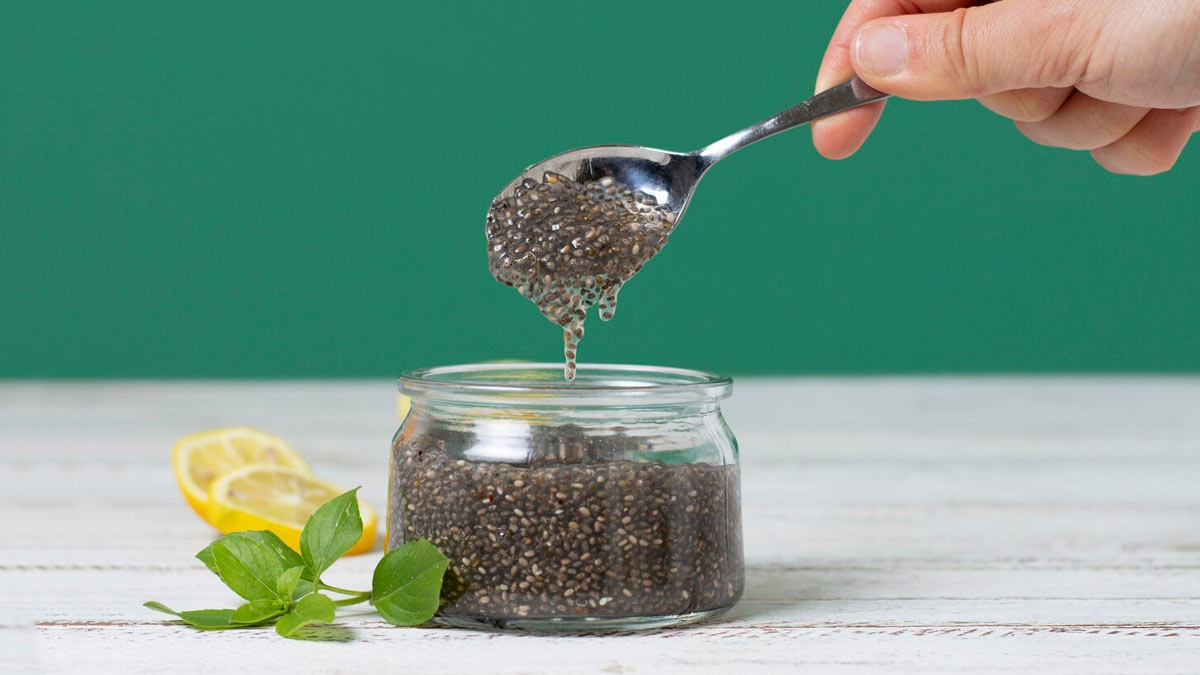
Chia seeds have become immensely popular for their nutritional benefits, such as weight management and digestive health. But did you know they play a crucial role in promoting a healthier heart too? If you are dealing with high cholesterol levels, it’s time you include this superfood in your diet. We spoke to our expert Abhishek Gaggneja, Founder and Health Coach, Goodveda to understand the benefits of consuming chia seeds for lowering cholesterol levels and promoting heart health.
Table of Content:-
Health Benefits Of Chia Seeds For Lowering Cholesterol

Powerful Antioxidants
“Chia seeds also pack a punch as a great source of antioxidants, fighting inflammation and oxidative stress—two factors that contribute to heart disease”, said Gaggneja. These antioxidants act as guardians, protecting cholesterol particles from harmful oxidation and maintaining arterial health.
According to a study published by Food Science and Nutrition, chia seeds are a good source of quercetin, an antioxidant that helps lower the risk of various health conditions, such as heart disease and coronary illness.
Rich In Omega-3 Fatty Acids
Despite their small size, these seeds are rich in omega-3 fatty acids, particularly Alpha-Linolenic Acid (ALA), which is vital for reducing the risk of heart disease by lowering Low-Density Lipoprotein (LDL), which is bad cholesterol. According to the same study mentioned earlier, ALA supports cardiovascular health by lowering inflammation and enhancing blood vessel function.
Also Read: Are Chia Seeds Effective For Weight Loss? Experts Weigh In
Rich In Fibre
Chia seeds excel as a great source of soluble fibre, which is essential for lowering cholesterol. Gaggneja added, "Chia seeds' soluble fibre binds to cholesterol particles in the digestive tract, preventing the bloodstream from absorbing them; this significant drop in LDL cholesterol levels promotes general heart health."
According to the Harvard School of Public Health, the primary sources of fibre in chia seeds are soluble fibre and mucilage, which gives moistened chia seeds their sticky texture. By slowing down digestion and lowering LDL cholesterol, these fibres may help to reduce post-meal blood sugar increases and increase feelings of fullness.

Regulates Blood Sugar Levels
Beyond cholesterol management, chia seeds indirectly support heart health by stabilising blood sugar levels. “Fluctuations in blood sugar can lead to inflammation and an increased risk of heart disease. Chia seeds contribute to a healthier cardiovascular system by helping maintain stable blood sugar levels”, added Gaggneja.
Also Read: Controlling High Cholesterol: Expert Lists Dry Fruits To Control Your Cholesterol Levels
Ways To Add Chia Seeds To Your Diet

- Consider adding chia seeds to your oatmeal or yoghurt
- Add it to your pancakes, muffins, or puddings
- Add it to your smoothies or soups
- Sprinkle it on your salad
- Drink chia-infused water
Message From The Expert
“While chia seeds alone won't cure heart issues, incorporating them into your meals and snacks can be a valuable step in lowering cholesterol and promoting heart health”, highlighted Gaggneja. Combine them with other heart-healthy options like leafy green vegetables, berries, walnuts, fish oil, and whole grains, such as oatmeal and brown rice for a comprehensive approach.
Bottomline
Gaggneja concluded, “It's crucial to approach dietary changes with caution, and seeking personalised advice from a healthcare provider is important for controlling cholesterol and enhancing heart health. Including chia seeds in a well-rounded, heart-healthy diet represents a minor but meaningful step toward a healthier heart, thanks to their impressive nutritional profile and potential benefits.”
[Disclaimer: This article contains information provided by a registered healthcare professional and is for informational purposes only. Hence, we advise you to consult your expert for a dietary plan tailored to your body type and medical history.]
Also watch this video
How we keep this article up to date:
We work with experts and keep a close eye on the latest in health and wellness. Whenever there is a new research or helpful information, we update our articles with accurate and useful advice.
Current Version